Image
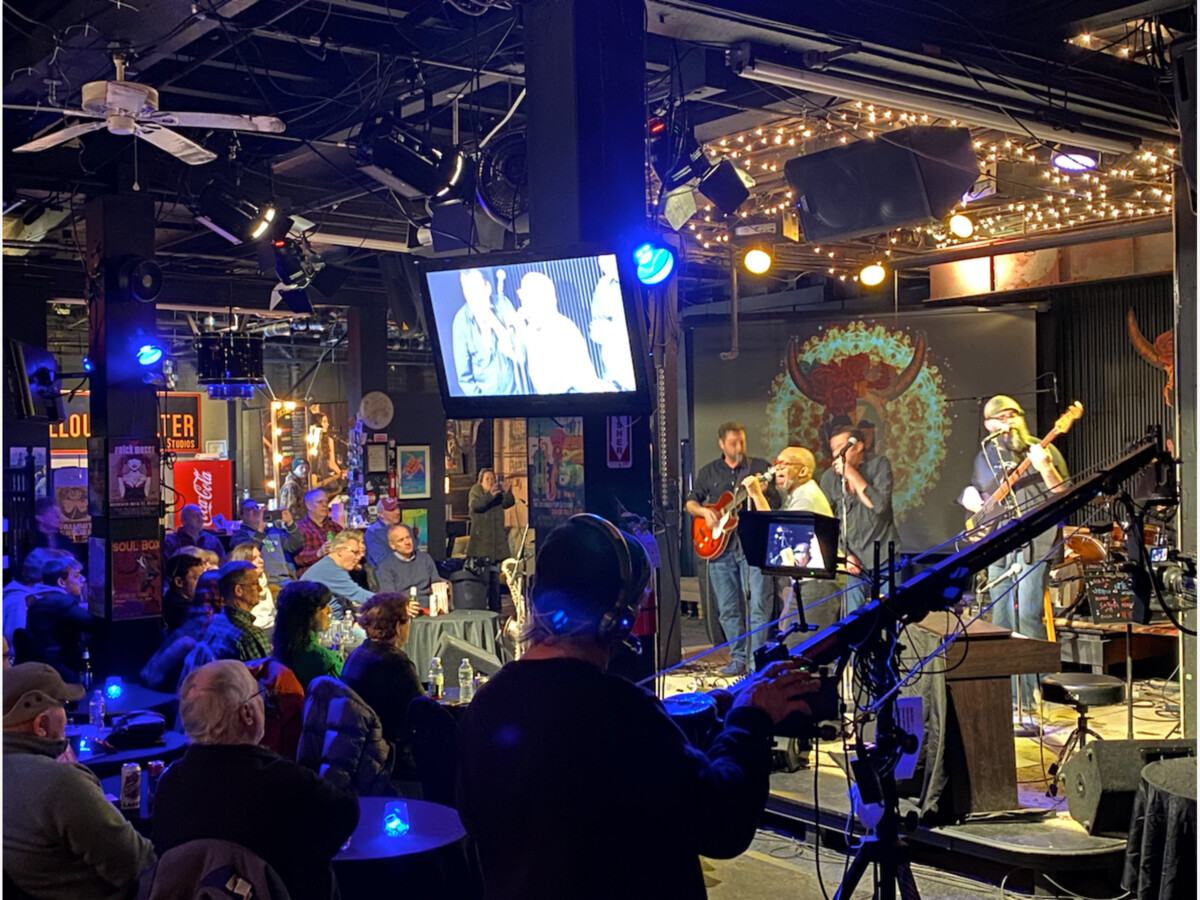

The Fallout Shelter in Norwood has announced that the Kemp Harris Group is on its last of four performances of its residency at the Fallout Shelter this Saturday, May 20th, and you may ask, what is the Fallout Shelter? Although it has been around since 2015, until this year, neither I nor my friend Deb, who is a long-time Norwood resident, had heard of it. But after an experience at the venue – an intimate club-like setting with recording studio and stage - we won’t forget it.
We made our first visit to the Fallout Shelter in February for the opening performance of Kemp Harris’ residency, after founder Bill Hurley recommended a visit to get the full "experience." After visiting, one can understand the recommendation. The music at the Fallout Shelter will bring you back for more, but the renovations Mr. Hurley has made - to what was previously a storage space of a furniture store - is part of the Fallout Shelter charm which helps makes the experience even more memorable.
“I wouldn’t have come here [for the first time] if not for the music. But because of the music [and] because of the surroundings, I would come back,” said Deb, noting that the personal attraction of the venue for her is half in the music, and half in the setting.
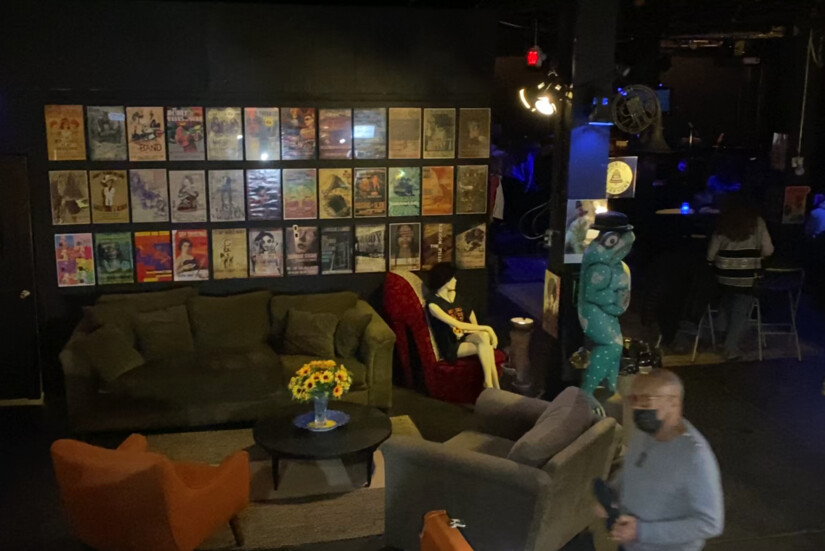 Photo by Westwood Minute/Darlene Wong Cancell. The Fallout Shelter offers a unique and cozy atmosphere to visitors.
Photo by Westwood Minute/Darlene Wong Cancell. The Fallout Shelter offers a unique and cozy atmosphere to visitors.Deb characterized it well, calling the location a “really funky little club that hearkens back those intimate little clubs back in the 60s and 70s that were all around Boston and are now gone.” She described the set-up as comfy, easy, and friendly. “It’s really like a little, cool, intimate club.”
When asked to describe his business, Founder Hurley said, “It’s got a funky vibe, European vibe to it. I’ve been in 3000 night clubs in the course of my career and I took something from a lot of places I’ve been in. It’s not really one place. It’s a long career of seeing what really worked for me,” he said.
 Photo by Westwood Minute/Darlene Wong Cancell. View of the main floor at the Fallout Shelter, as seen from the top of the stairs near the entrance. A desk is in the foreground and in the background are a seating area (left) and video editing area (right).
Photo by Westwood Minute/Darlene Wong Cancell. View of the main floor at the Fallout Shelter, as seen from the top of the stairs near the entrance. A desk is in the foreground and in the background are a seating area (left) and video editing area (right).Mr. Hurley’s career includes working at Atlantic Records for fifteen years. He was doing record promotions there before he immersed himself in the world of independent music at the Fallout Shelter. Now, he's promoting independent artists. His goal is to help level the playing field for them, where growing their careers usually requires a lot more cash than they have.
A unique offering of the Fallout Shelter is its fully functioning sound stage and recording studio, where a live audience sits in a cabaret type setting to watch a production of Mr. Hurley’s Extended Play Sessions. He has been holding the Extended Play Sessions for the last 12 years. It has been in the last eight years that the sessions found a permanent home with the opening of the Fallout Shelter in 2015.
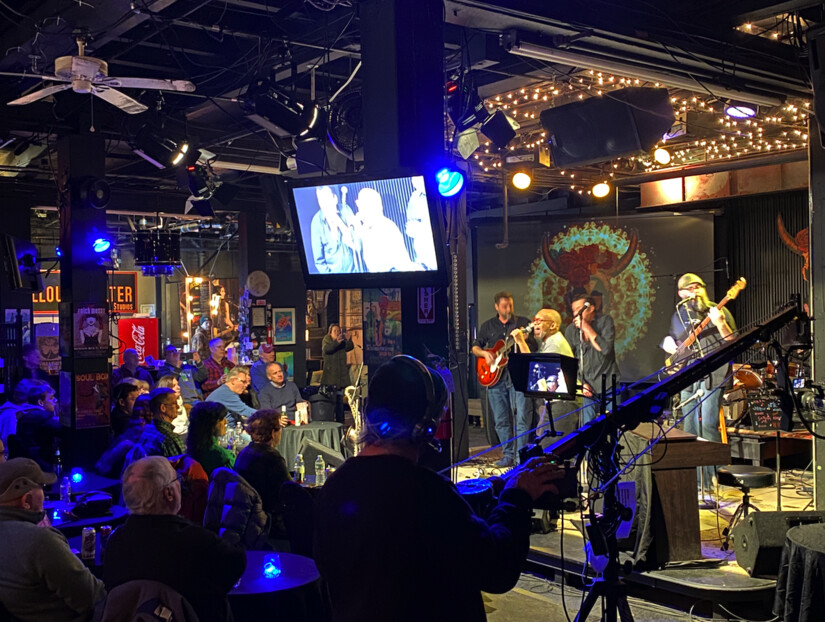 Photo by Westwood Minute/Darlene Wong Cancell. The Fallout Shelter's Extended Play Sessions are both live performance and a studio recording, in an intimate, cabaret-style setting. In the foreground, founder and owner Bill Hurley operates one of five cameras for a livestream recording.
Photo by Westwood Minute/Darlene Wong Cancell. The Fallout Shelter's Extended Play Sessions are both live performance and a studio recording, in an intimate, cabaret-style setting. In the foreground, founder and owner Bill Hurley operates one of five cameras for a livestream recording.“We’re providing a very high-end video content with multitrack recorded audio,” said Mr. Hurley. “You [usually] have to pay a lot to get quality content, but it’s [provided at] no cost to the artist in exchange for playing a show.” He further explains, “Artists get content to use. . . . Artists use the high-end video for promotions and bookings.”
On the day of Kemp Harris’ February performance, the audience sat on lounge chairs and barstools, comfortably chatting and mingling in the time ahead of the performance. Mr. Hurley recommended that visitors arrive at 6:00 p.m. for a 7:00 p.m. performance. It’s a good amount of time to order a drink, get something to eat, check out the surroundings and find a seat, and relax and chat before Mr. Harris and his friends would take to the stage.
When a show begins for the live audience and studio recording, there are five cameras, a lighting director, a sound person, and a person directing a livestream of the event to YouTube and Facebook. At the Kemp Harris performance, the audience was a relaxed, comfortable, and sedate crowd, unfazed by the unusual and interesting set up.
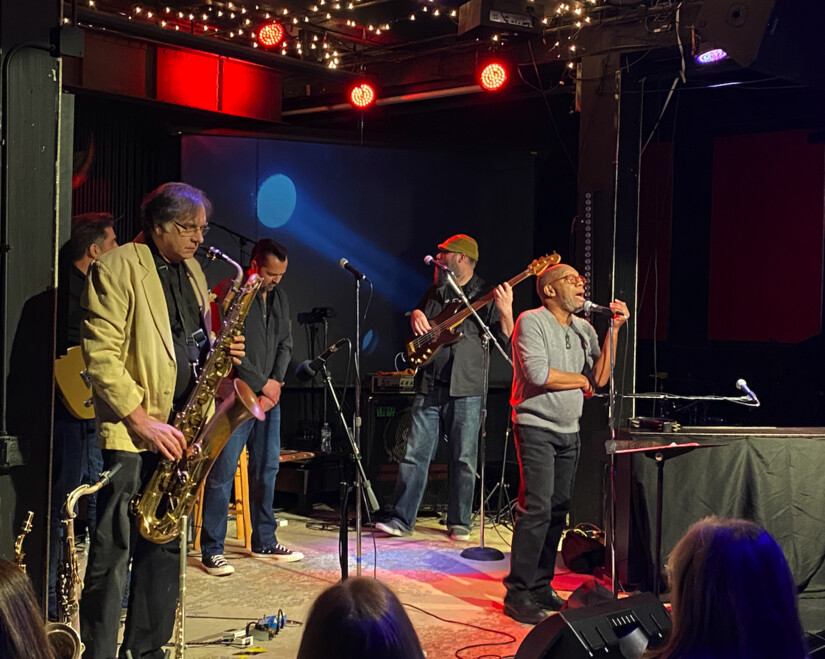 Photo by Westwood Minute/Darlene Wong Cancell. Kemp Harris performs vocals with his friends on guitar, harmonica, and sax at the Fallout Shelter on February 4, 2023.
Photo by Westwood Minute/Darlene Wong Cancell. Kemp Harris performs vocals with his friends on guitar, harmonica, and sax at the Fallout Shelter on February 4, 2023.By now, the Fallout Shelter staff are well rehearsed in what has to happen to pull off the night’s production. “It’s become second nature, and it’s become a dance,” said Connor Quigley, director of the livestream production. He has worked at the Fallout Shelter since 2016, the year after it opened. Mr. Quigley admires that Mr. Hurley knows how to surround himself with people who are as passionate as Mr. Hurley is about live music and production. “It’s incredible to be able to work with these people and be in this environment and get paid to watch the best live music that you can see in the area,” said Mr. Quigley.
Mr. Quigley is in charge of taking the raw audio from the performance, which he mixes and masters to achieve audio that is “album level quality.” Then, he passes it onto Mr. Hurley, who operates a camera during the live performance and edits the video with audio post-performance. Immediately after the live show, the performance can be viewed on YouTube and Facebook. In a few weeks, there will be a media product that is fully mixed, mastered, and fully edited. That product is given to the performing artist, at no charge.
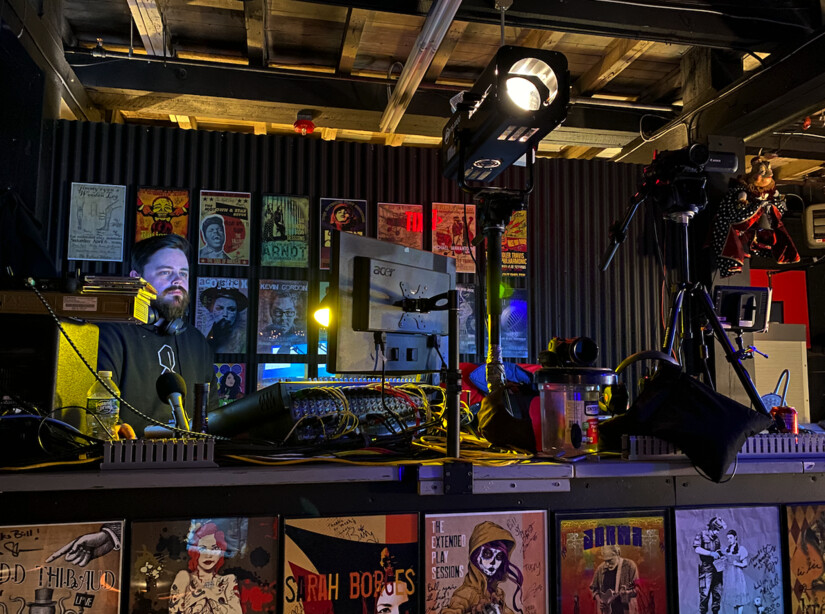 Photo by Westwood Minute/Darlene Wong Cancell. Colin Quigley, director of the livestream for the Fallout Shelter's Extended Play Sessions, stands at the back of the room with his audio and editing equipment.
Photo by Westwood Minute/Darlene Wong Cancell. Colin Quigley, director of the livestream for the Fallout Shelter's Extended Play Sessions, stands at the back of the room with his audio and editing equipment.“The bands don’t pay for this whole production thing . . . . Pretty much no one can afford to pay an exorbitant amount of money for a five-camera, full 24-track recorded and livestreamed performance. We’re talking [ ] tens of thousands of dollars, probably,” says Mr. Quigley.
It's a very generous gift that Mr. Hurley routinely gives to the artists who perform at his venue, week after week. On top of that, Mr. Hurley emphasizes his strong conviction that the independent artists that perform at his venue must be paid a fee - artists should not be asked to perform for free. So how does Fallout Shelter sustain itself? The Fallout Shelter’s business model relies on ticket sales and beverage sales, and also a little fundraising, says Mr. Hurley.
Grass Roots Cultural and Performing Arts Center (GRCPAC), a 501(c)(3) organization, is the parent company to The Fallout Shelter. GRCPAC’s mission is to preserve and promote roots music. That means preserving jazz, soul, blues, folk, certain types of rock, and R&B.
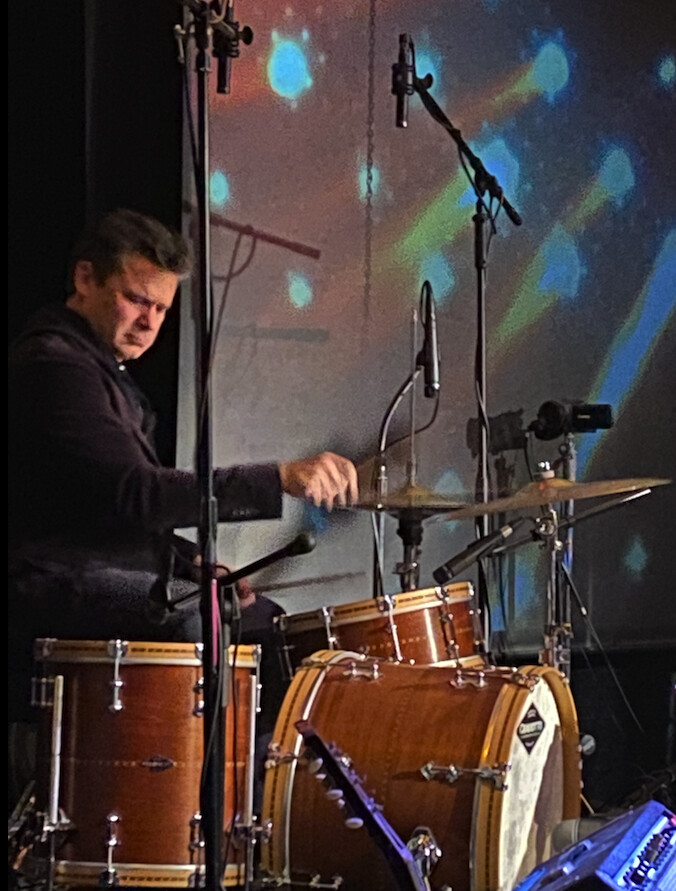 Photo by Westwood Minute/Darlene Wong Cancell. A drummer performs with Kemp Harris at the Fallout Shelter in February 2023.
Photo by Westwood Minute/Darlene Wong Cancell. A drummer performs with Kemp Harris at the Fallout Shelter in February 2023.Mr. Hurley is not much into heavy metal, but “We dabble,” he says. He appears open to bringing all types of music to his venue, beyond his core focus, at least in small doses.
When Kemp Harris performed on that February night, it was funky and bluesy, a good match for his surroundings. He provided vocals and sometimes played the keyboard, while his friends joined him on stage with guitar, sax, and harmonica. Later in Mr. Harris’ residency, in April, he would plan to bring a more theatrical vibe to The Fallout Shelter, utilizing a large video screen as his background, while he performed and discussed his writing and work with the Alvin Ailey American Dance Theater. This Saturday, May 20th, the Kemp Harris Group gives the final performance in its residency at the Fallout Shelter. Mr. Harris is expected to perform audience favorites.
Mr. Hurley has announced plans to put together footage from Mr. Harris’ four-part residency into a documentary which he plans to premiere at the Fallout Shelter next year. It sounds like yet another creative brainchild from Mr. Hurley to help preserve roots music, and one to keep tabs on.
Thanks to Bill Hurley, Connor Quigley and Deb for contributing information for this article.
- What To Do Around Westwood this Weekend: Friday, May 19 - Sunday, May 21
- Gospel Sunday (Calendar event)
- Westwood Artists Holds a June Marketplace at the Senior Center